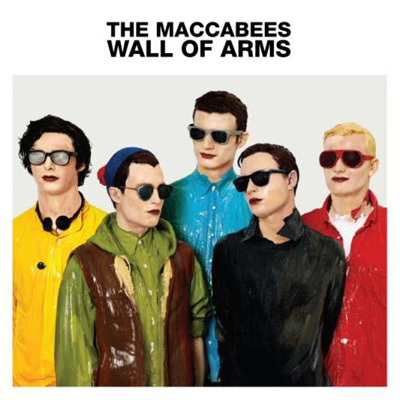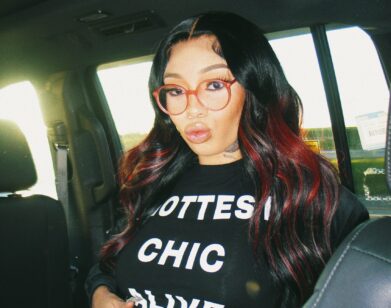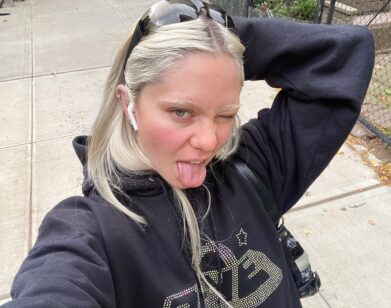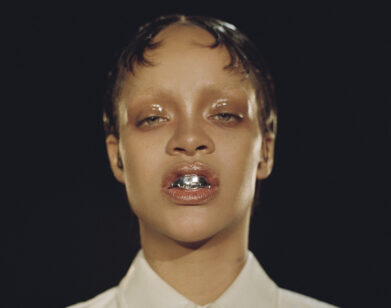The Maccabees: Roll With It

What’s not to love about a band whose first recording experience went down in a converted bomb shelter on the Isle of Wight with a drum kit hewn from a Victorian-era dance floor? Then again, what would you expect from a band who picked their name—The Maccabees—out of the Bible at random because it “just sounded like a band?” A novel Biblical interpretation, to say the least. “It turned out to be that there was a band in Birmingham, England with the same name and so we had to ask them if they minded us being called it as well. We appealed to their Christian sensibiilities so they allowed it,” frontman Orlando Weeks, 25, says with a laugh. “I remember in the early days we kept turning up to gigs thinking they’ve got the wrong one. They must have wanted the Christian Birmingham rock band.”
Though he’s shy, almost meek, on the phone, Weeks puts on a beast of a live show, careening about the stage as if possessed by the ghost of Ian Curtis. He and his four bandmates (Hugo White, Felix White, Rupert Jarvis, and Sam Doyle) were actually banned from all Brighton venues after a riot broke out at a 2006 gig. Following up on their 2007 debut Colour It In, which drew comparisons to Bloc Party, The Rakes, and Joy Division for its danceable, bittersweet rock tunes, the boys from Brighton have settled down for their sophomore effort, Wall of Arms. Currently burning up the UK charts, it was produced by Marcus Dravs (Bjork, Coldplay, Arcade Fire) and applies a dark veneer over arena-sized pop in a deliberately go-for-broke fashion—with choral and brass arrangements and haunting David Byrne-ian vocals from Weeks—while retaining the essence of their candescent live sound, which will be on display in New York this Saturday at Williamsburg Music Hall and Monday at the Mercury Lounge. Here Weeks sounds off on the new album, his plans for the U.S. tour, and cheese rolling. Yes, cheese rolling.
MICHAEL SLENSKE: I just listened to the new album. It sounds a lot different, slower than the last one. There’s a bigger sound.
ORLANDO WEEKS: The first one was about writing songs to go play at gigs where hopefully there’d be 20 people. It needed to make an impression. This one was written because we knew we were going to get to record it, the live aspects being secondary. We’re making the most of the opportunity to be recording. If we can than we should go as grand as we can without losing the point of the things people feel are good about our band.
MS: What do you think that is?
OW: I’m not sure. I think you just know if you go too far, that’s all. We wanted to push it as far as we could without ever feeling that that was happening.
MS: Are you drawing on different influences than before?
OW: I think the key influences are still the same: Interpol, Arcade Fire, and The National, all of these bands that essentially have a similar attitude, that everything works for each other. It’s kind of egoless music. We all listen to pretty different stuff. Felix has listened pretty much to Public Enemy, NWA, and Biggie Smalls for the last year and Hugo’s listening to Leonard Cohen and Orange Juice and that Postcard Records thing and I’ve been listening to Thom Yorke. I just got that Fever Ray record, which is amazing, and Animal Collective. And Rupert listens to AC/DC. It’s ridiculous. On paper the mixing of those listening points sounds like the worst piece of music ever maybe.
MS: How was it working with Marcus in the studio?
OW: I think we knew that he makes stuff sound brilliant and it would mean that if it didn’t work it was our fault and the songs that didn’t carry. A lot of the time he was trying to rein us in and prevent us from throwing the kitchen sink at it. I kind of envisioned string ensembles and choirs and really trying to take it apart a bit. But he was very keen that we didn’t lose the spirit the first record has even if we were going to try this grander sound. We have some brass on their from some guys who’ve played with Arcade Fire and Beirut so that was a real treat.
MS: I know you’re hands-on with the artwork and videos. Tell me about the new cover.
OW: I found this artist called Boo Ritson. I think she’s really going to go places. She’s got her first Saatchi show coming up. She sort of dehumanizes people a bit. They’re portraits, I suppose, but it sort of makes you someone else. I look at the thing and I don’t see me, I see this thing which is nice.
MS: It’s like a wax image or something.
OW: No she paints onto you—your skin, your hair, and your clothes and you sort of become a painting and then she photographs it. I think it’s one of the first times I’ve brought a piece of artwork to the boys and said, “This is what I want to try.”
MS: Are you doing any other videos?
OW: I commissioned a documentary on cheese rolling [for the single “Can You Give It”]
MS: Cheese rolling?
OW: There’s this festival to celebrate the making of cheese in Gloucestershire and people risk life and limb—broken legs and arms are really common—just chasing a wheel of cheese down a really steep hill and the winner gets to keep the cheese. And that’s it. When the war was going on and there were rations they did the same thing except it was a fake cheese because they didn’t want to waste cheese rolling it down the hill. It’s just weirdly British, and worth celebrating.
MS: Anything special planned for the U.S. tour?
OW: We met a New Yorker the other day called The Reverend Billy. He’s an anti-consumerist guy who walks around to the Disney stores and bludgeons Mickey Mouse teddy bears or goes into Starbucks with a choir and sing free-trade songs. I met him at an interview the other day in London and I gave him my email because I wanted him to come emcee the gig. I figured I might say it to you and he might read it and come out so I quit bugging him.






